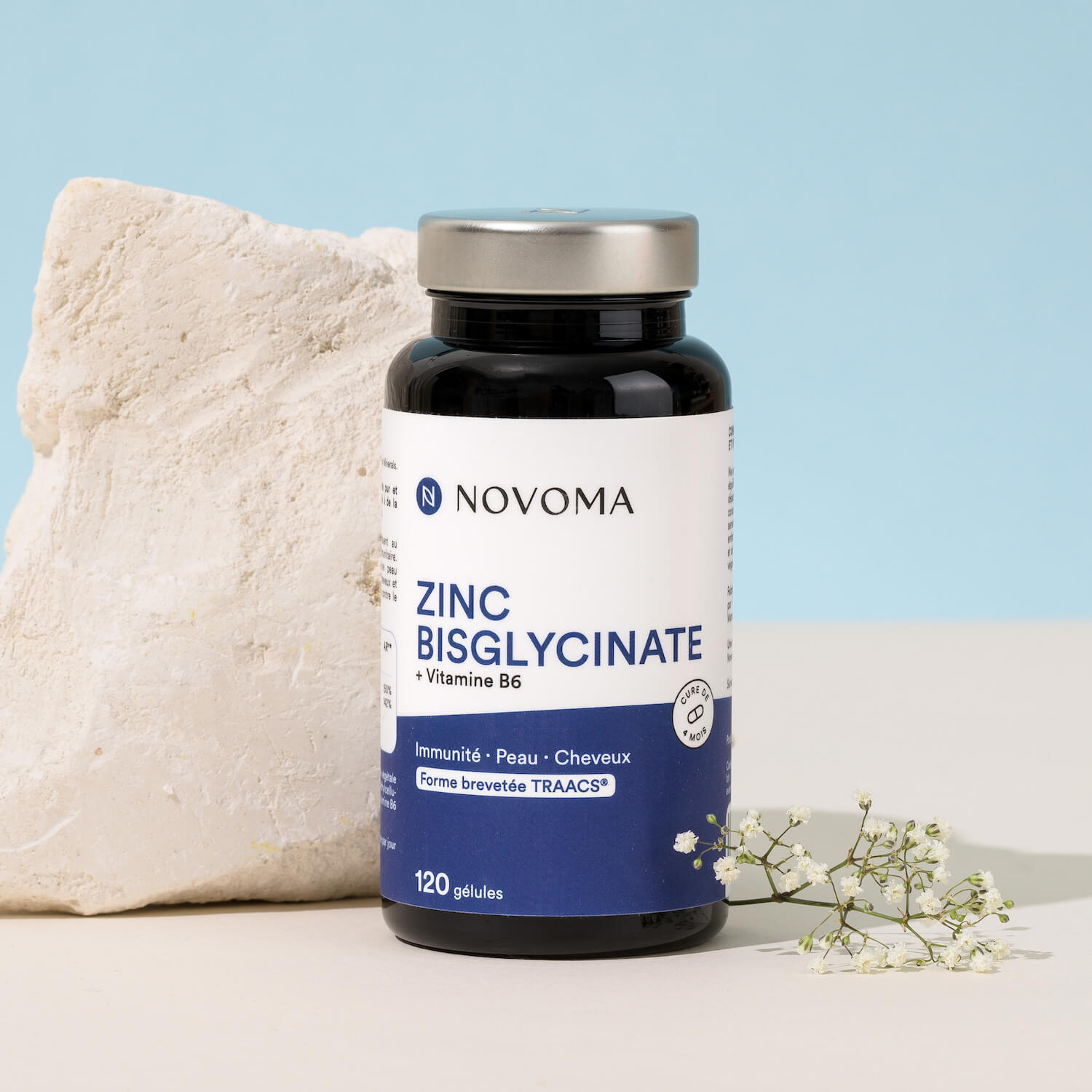
Zinc
It's no longer a secret: we eat worse today than yesterday, especially in industrialized countries. The logical result of this observation is the worsening of micronutrient deficiencies, which are becoming more and more frequent. Whether in vitamin D, iron, zinc or other essential nutrients, dietary deficiencies are developing and can ultimately have serious consequences on our health.
Do you seem to be getting sick more often? Is your hair duller than before, your skin less beautiful? You may be suffering from a zinc deficiency. Find out more about this antioxidant essential to well-being !

What is zinc?
Although present in very low doses in the body (less than one mg per kg), zinc is a trace element essential for the proper functioning of the body. In this same family of trace elements, we can cite iodine, iron, potassium... Each plays a specific role in the precision mechanics that is the human body.
Zinc composes or allows the activation of nearly 200 enzymes, thus accelerating certain natural chemical reactions . It plays a role in the metabolism of proteins, lipids and carbohydrates, regulates the production of hormones such as insulin or gustine, and has an anti-oxidant action.
The main sources of zinc
The main sources of zinc reside in products of animal or plant origin, although the former are better assimilated than the latter. Thus, the products that provide the most zinc are seafood (especially oysters) followed by meat (especially beef and veal).
Zinc is also found in dairy products, such as cheese or yogurt, cocoa powder (unsweetened), whole grains and certain nuts and seeds: almonds, pistachios, pecans or cashews, etc.
Zinc deficiency: what are the consequences?
As we can see, sources of zinc are not necessarily among the most consumed foods, particularly in certain types of diets (gluten-free, vegan, etc.). Zinc deficiencies are therefore quite common, unfortunately, which is not without consequences. Especially since zinc influences many enzymes.
Possible symptoms and dangers of zinc deficiency include:
- Weakening of immune defenses (more common infections or diarrhea);
- Hair loss, brittle nails;
- Fertility disorders in men;
- Risks of fetal malformation in pregnant women;
- Growth retardation in children;
- Peeling skin, slowed healing;
- General fatigue, depression;
- Muscle cramps and loss of appetite and weight;
- Affects the senses: weakened sense of smell, vision problems, particularly at night.
The list is not exhaustive, because zinc is a rich and complex trace element, with numerous implications in the body. But hair loss and brittle nails are known as the most direct symptoms, which should alert you that it is probably time to supplement or review your diet!
We recommend you
Zinc Bisglycinate
Synergistic formula based on zinc bisglycinate and bioactive vitamin B6.
- ✅ Optimal assimilation
- ✅ 15 mg of elemental zinc per capsule
- ✅ Made in France
- ✅ 4 months of treatment
What are the benefits of zinc?
As you will have understood, the benefits of zinc are as numerous as its deficiency leads to potential adverse effects.
One of its main roles is to help maintain the immune system . By ensuring a suitable level of zinc, i.e. 10 to 15 mg per day, you reduce your risk of contracting diseases and infections, and protect your cells from oxidative stress . Additionally, zinc helps reduce the risk of cardiovascular disease and cancer.
As we have said, this antioxidant also plays a major role in the good health of nails and hair , by helping to synthesize keratin and collagen, which are closely linked to them. It improves the skin , reducing acne or psoriasis as well as skin imperfections .
Zinc also ensures good growth in children ; it participates in healing and muscle mass gain; in men it increases fertility , because it increases the production of sperm as well as their mobility.
Zinc dosage and advice for use
A zinc treatment is recommended if you feel your immune system is weakened, you have skin problems, your nails are brittle or your hair is falling out abnormally.
To support your immunity and take care of your skin, hair and nails , the recommended amount is 10 to 15 mg per day.
The recommended treatment duration is 2 months. You can renew it by taking a break of at least two weeks between each treatment.
If you follow a spirulina treatment at the same time, be sure to separate the intake of the two supplements by at least two hours.
Follow the prescribed doses, because excess zinc can also have serious consequences, such as copper deficiency (leading to anemia) or a reduction in “good” cholesterol.

How to choose the right zinc food supplement?
If you are deficient in zinc, your first instinct should be to review your diet. But at the same time and to restore the situation more quickly, zinc supplementation is obviously a good solution. As long as you choose a healthy, well-dosed and effective product.
The most common form of zinc food supplements is the capsule, which is convenient to consume. But not all zinc capsules are equal!
Two determining elements must be taken into account in your choice: the quantity of active element per capsule, and its degree of absorption. The amount of zinc included in your food supplement is decisive to ensure an effective treatment, so that you do not find yourself having to consume handfuls of whole capsules every day.
Absorption depends on the form of zinc used in the supplement. Certain forms of zinc are more easily assimilated by the body than others; the less assimilable forms will be much less effective in regulating your zinc levels and bringing them back to normal.
This is why we opted for zinc bisglycinate as the active ingredient. Indeed, zinc bisglycinate is much better assimilated than other forms such as zinc citrate or zinc oxide . We have it as a bonus associated with bioactive vitamin B6, which facilitates the assimilation of zinc.














